Lip piercings on the body may release an unpleasant odor. This can cause concern, as you may worry that your piercing is medically wrong. This issue is quite common and can typically be resolved with proper hygiene. Therefore, taking care of your piercing and keeping it clean is essential to prevent unpleasant smells.
There is some scientific explanation behind the unpleasant smell that your lip piercing may emit. This smell is because of the lack of oxygen reaching the area where the piercing is located.
The buildup of sebum, dead skin cells, bacteria, and dirt in the piercing tunnel can cause a foul odor. Combining these elements creates a smelly mixture that can be the reason for the smell.
This blog post will explain the natural causes of odor and how to eliminate it.
Why Does My Lip Piercing Smell: 7 Real Causes

A common concern among those with lip piercings is the occurrence of an unpleasant odor. This smell can be disconcerting, but it's often a normal part of the healing process or because of other factors that can be quickly addressed. Here are some reasons your lip piercing might smell:
- Low-Quality Metals: Based on a discussion thread on piercing, one of the potential reasons for your lip piercing to smell could be the quality of the metal used in the jewelry. Low-quality metals can lead to irritation, one symptom of this irritation might be an unusual odor. Choosing high-grade, hypoallergenic metals like surgical steel or titanium for your piercings is crucial to minimize this risk.
- Dead Skin Cells and Oils: A post from hipforums.com suggests that another cause of the peculiar odor could be the accumulation of dead skin cells and oils around the pierced area. The body sheds dead skin cells and secrete oils, which can build up around the piercing. If not properly cleaned, they can produce a funky smell.
- Oxygen Deprivation: Bodycandy.com makes an intriguing point about oxygen deprivation being a potential cause for the smell. When the pierced area doesn't get enough oxygen, your body responds by producing a distinct funk. This is especially true for sites where the piercing directly touches your body.
- Dirt and Residue: Another possibility is the collection of dirt or soap residue between your piercing and your lip. These tiny particles can easily get trapped and cause an unpleasant smell if not cleaned regularly. Ensuring thorough rins after cleaning and maintaining good oral hygiene can help prevent this.
- Bacteria and Skin Cells: The smell from a piercing doesn't always show an infection. Often, it's just a mixture of bacteria and skin cells. This doesn't mean you should ignore it, though. Regular and thorough area cleaning can help keep the odor at bay.
- Aftermath of Eating: Food particles can get stuck into your piercing after a meal, leading to an unpleasant odor if not promptly cleaned. Hence, it's advisable to rinse your mouth after eating to ensure no food residue is left behind on your piercing.
- Infections: If your piercing becomes infected, it could cause a strong odor because of the buildup or leakage of pus. While this is less common, it's essential to be aware of this possibility if you notice a persistent smell accompanied by other symptoms like pain, redness, or swelling.

Get Rid of The Smell From My Lip Piercing: 3 DIY Solutions
If you've noticed that your lip piercing has an unpleasant smell, it could be because of a bacterial infection. Antibiotics may be required in such cases, so you must seek medical attention if you notice any signs of infection. However, you can also use over-the-counter (OTC) medications and home remedies to manage your situation.
Over-the-Counter Medication
OTC medications can help make the healing process more bearable. Here are some options:
- Pain relievers like ibuprofen can manage discomfort.
- Antihistamines can relieve itching if you're experiencing an allergic reaction.
- A topical antibiotic, if recommended by a healthcare provider, can help fight the infection.
At-Home Solutions

Besides OTC treatments, there are also at-home remedies that can be beneficial. These include:
- Applying ice to the infected area to lessen pain and swelling.
- Rinsing with a saltwater solution keeps the area clean, especially after meals.
- Use a warm compress to encourage drainage.

Cleaning Routine
Keeping your piercing clean is vital, mainly if an infection develops. Here's how to maintain cleanliness:
- Always wash your hands thoroughly before cleaning.
- Rinse with a saltwater solution or apply it to the area.
- Use an alcohol-free mouthwash.
- Clean the exterior with a mild, fragrance-free soap.
- Rinse the piercing with water to get rid of any soap residue.
- Dry thoroughly with a paper towel.
Preventive Measures

The key to preventing infection lies in good aftercare habits. Keeping the area clean is up to your piercer. Here are some tips:
- Avoid foods that irritate your piercing, such as spicy items.
- Eat things that won't stick to your pierced lips.
- Be careful opening your mouth too broad, as your piercing may catch.
- Keep the piercing clean.
- Get plenty of sleep.
- Eat nutritious food to support your body's healing process.
- Regularly wash your bedding, particularly pillowcases.
- Opt for showers instead of baths while your piercing is healing.

Conclusion
It's not uncommon for your lip piercing to give off a funky odor, and it can cause undue stress. However, it's usually not a cause for concern. The most common reasons behind the odor are low-quality metals, dead skin cells, oils, dirt, bacteria, a lack of oxygen at the piercing site, and even the aftermath of eating.
Maintain your lip piercing by adhering to a strict cleaning routine, using over-the-counter medications or home remedies, and adopting healthy habits. Consult a professional if you notice any signs of infection. Good hygiene and quality jewelry are essential.
Remember, a clean piercing is a happy piercing. So keep up with that saltwater rinse, avoid irritating foods, and make sure your bedding is as fresh as can be.












